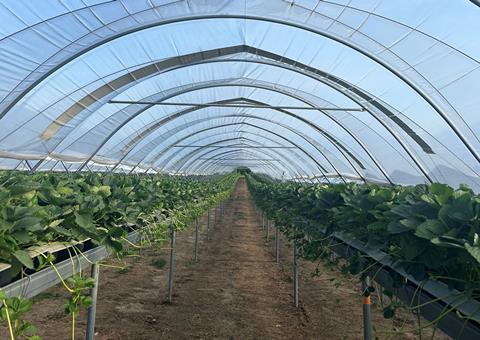Electric Berry project powers farm tools and equipment using flexible solar panels attached to top of its polytunnels, with no extra land required

Renowned Kent berry grower Hugh Lowe Farms is exploring a new way of using solar power in strawberry and raspberry cultivation through its ‘Electric Berry’ project.
In collaboration with Polysolar Ltd and scientists from the University of Greenwich, the producer has installed integrated flexible solar panels to the top of some of its polytunnels.
In total, 60 panels are being used, with the potential to generate up to 15MWh hours per year. They have reduced the site’s electricity import by around 90 per cent, saving just under three tonnes of CO2 emissions.
The Innovate UK project, which was first trialled by Hugh Lowe Farms in 2022, aims to generate solar electricity directly on the farm, to power various tools and equipment, including harvesting robots, irrigation pumps, and electric vehicles.
The main benefits of this method, according to Hugh Lowe Farms MD Marion Regan, are that in-field power enables precision horticulture (powering sensors, irrigation and automation). Conveniently, the maximum electrical yield naturally occurs when the demand for power is high, for example when irrigation is required.
Importantly, no extra land is required for the solar panels, and since polytunnels are temporary structures, the land used to produce power remains as farmland rather than being degraded for solar farms.
In addition, Regan says the solar panels provide partial shade in the polytunnels, which reduces peak heat, vapour pressure deficit (VPD), and hence plant stress, briefly at the height of the day. This can potentially reduce water use and enhance berry yield.
There had been concerns that the shading caused by the solar panels in the polytunnels would have a negative impact on crop growth and yield, but Regan says this has not been the case in her trials.
She adds that the structures have proven resilient to weather, and that training workers to install, manage and move the panels has gone well.
According to Regan, there is a “great deal of international interest” in the project, and Hugh Lowe Farms is looking for growers of different crops interested in trialling the system. The set-up is on display at the Chelsea Flower Show from 20 to 24 May.
In addition to solar energy, Hugh Lowe Farms is also adopting sustainable practices by using recycled coir substrate provided by ReCoir instead of peat for berry cultivation.



